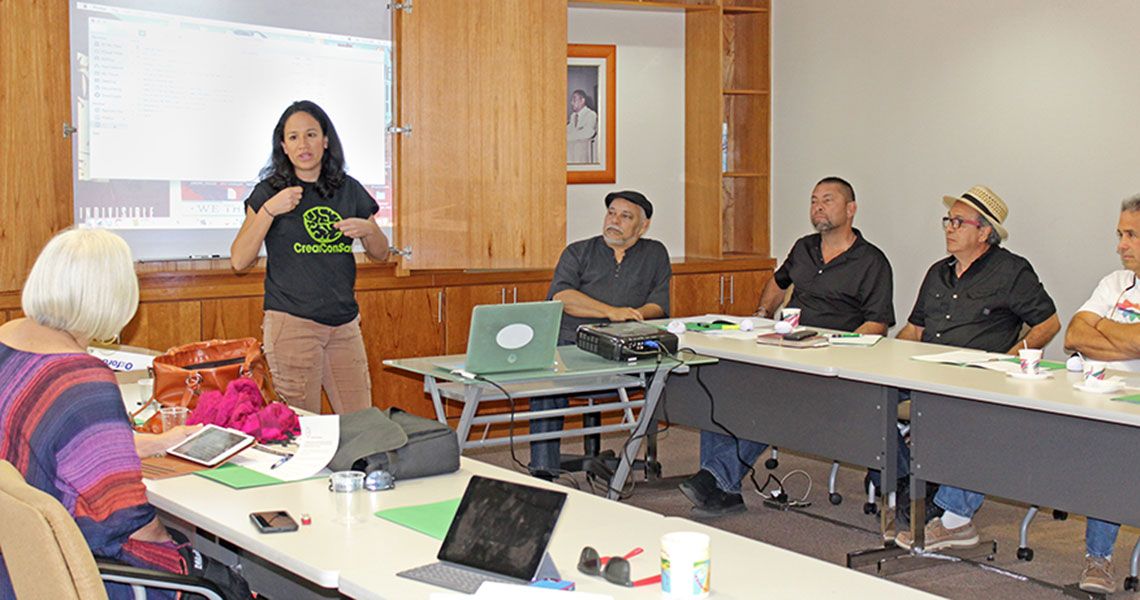From the airplane’s windows, Vanessa Torres-Llenza, MD, looked out on her former Puerto Rican homeland and saw a landscape dotted with blue. The sight was a vivid illustration of the depth of devastation from Hurricane Maria: the pops of color were tarps tightly fastened to the tops of houses that once featured sturdy roofs.
Each day this Caribbean island’s residents wake up to a new normal. More than seven months after the hurricane slammed into the island, some people still live without power or running water, and many struggle under the weight of rebuilding homes and businesses. The recovery will be a long and arduous process, one that has already taken a toll, both physically and mentally, on residents.
For years, Torres-Llenza, assistant professor of psychiatry and behavioral sciences at the George Washington University School of Medicine and Health Sciences, committed herself to strengthening mental health care in Puerto Rico.
“My colleagues and I wanted to go back to Puerto Rico to teach medical students and high school students about mental health,” she said. That morphed into their Mental Health Tour 2015, which included workshops on the sciences at local high schools, and meeting with medical students to pique their interest in psychiatry as a specialty. In addition, the group of fellows did a workshop for children in a foster home to teach them skills to cope with stress and anxiety.
In 2015, Torres-Llenza and other psychiatrists of Puerto Rican descent who were fellows at the American Psychiatric Association began taking trips to the island to motivate young people there to pursue careers in psychiatry. Then, in 2017, they created a nonprofit, Crear Con Salud Inc. (Believe with Health) to further those efforts. But in a post-Maria Puerto Rico, the nonprofit’s immediate goals have changed to providing psychological first aid workshops.
Now, Torres-Llenza’s work is more important than ever. “Meeting with community leaders there, we realized they’ve been struggling with caring for the community. We saw a lot of demoralization; people keep asking ‘when is it going to get better?’ ” she said.
The workshops are meant to give both the community’s leaders and members the tools to help reduce burnout, stress, and anxiety brought on by the storm and its aftermath. The workshops, Torres-Llenza added, are based on ones conducted by Allen Dyer, MD, PhD, professor of psychiatry and behavioral sciences at SMHS, who works in Greece with workers tending to Syrian refugees.
“I saw a patient who was a community leader, and she said ‘I can’t do this anymore, I’m so stressed. People are asking me for things I don’t have. They think I’m a mayor, that I have power, and I don’t and I don’t have the answers. Sometimes I want to give up,’ ” Torres-Llenza explained. “So, the goal is for people like her to learn how to take care of themselves and understand when they are being overwhelmed and stressed.”
The workshops feature 15- to 20-minute discussions on psychological first aid topics such as burnout, the emotional stages of disaster, resilience, hope, and mindfulness, followed by an open conversation between participants and the psychiatrists.
Torres-Llenza remarked on the importance of Crear Con Salud’s partnerships with groups already on the ground in Puerto Rico for assistance with workshops and other efforts. Some of those groups include Puerto Rico Stands, Vamos Puerto Rico, PECES Inc., and Movimiento Una Sola Voz.
As lights slowly flicker back on throughout the island, there is still an internal darkness threatening to overwhelm its residents as they work to recover from the devastation. Torres-Llenza and her colleagues want to ensure residents have the tools to keep that darkness at bay.
“To be OK now means something different than it did before. Puerto Rico is recovering, but it will be a long process,” Torres-Llenza said. “But, I think people there are very resilient.”



